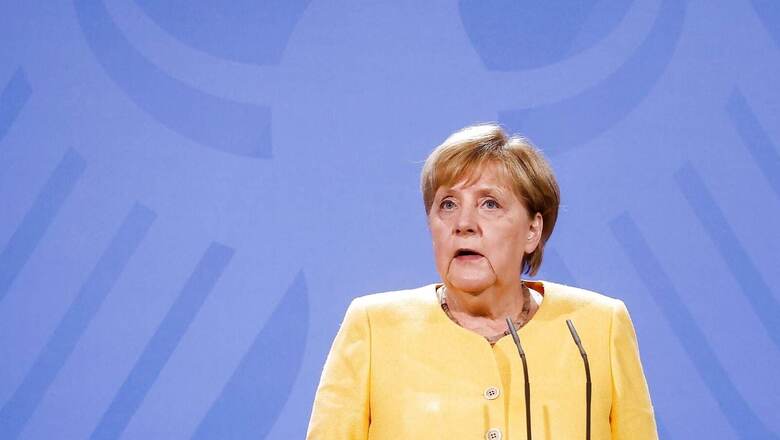
views
The 16-year saga of Angela Merkel as Chancellor of Germany is likely to conclude at the end of September. In the forthcoming elections, Merkel is neither the head of her party nor the Christian Democratic Union’s (CDU) candidate for the Chancellery.
At 67, Merkel is still youthful among leaders. Starting as a 51-year-old politician whom her mentor, Helmut Kohl, thought he could manipulate, she became ‘mutti’, a mother figure whom Germany learned to trust.
She came to prominence after the fall of the Berlin Wall. She won four consecutive elections and manifested western liberal values and globalisation, recently challenged by European and US nationalists.
Sixteen years is a long time in politics. Since 2005, Merkel has worked with four US presidents, four French presidents, eight each of Italian and Japanese PMs, Hu Jintao and Xi Jinping in China, and Putin in the Kremlin for most of her term with Medvedev in between. She effectively dealt with Manmohan Singh and Narendra Modi as Prime Ministers of India. In a recent poll in G7 countries, Merkel had the highest rating among leaders.
What is Merkel’s legacy? Talking to interlocutors in Germany, it seems that Merkel’s real legacy is that she led Germany to a level of satisfaction as upper middle class, middle-power citizens. Neither controversial nor prominent, yet Germany was efficient and satisfied at her ability to lead.
SEE | Once a Scientist, Now a World Leader: A Look At German Chancellor Angela Merkel’s Journey
Domestically
In Germany, her legacy will be measured more after her time. Successors will be judged on how Merkelianer they are. The CDU candidate, Armin Laschet, is known as a Merkelianer. Olaf Scholz, Vice Chancellor from the Social Democratic Party (SPD) who has led a spurt in the SPD support, chooses to be perceived as a Merkelianer during the campaign.
Despite the travails of the economic crisis in 2008, the Eurozone crises and the influx of refugees in 2015, she maintained the partnership of the CDU and the Christian Social Union (CSU) to continue as the dominant player in German politics. Coalitions being the norm, she took this beyond smaller parties to have Grand Coalitions with the SPD in three out of her four terms. She brought the pragmatic GroKo (grand coalition) into common parlance. This is despite the rise in the vote share of the Greens and Alternative für Deutschland (AfD) from within the CDU’s floating voters.
Merkel was a direct entry to national politics. Now both main contenders, Laschet of the CDU and Scholz of the SPD are former regional leaders. Merkel’s legacy is that she raised the level of responsibility of regional states.
Externally
Merkel’s external policies can be seen in different themes. Originally not a great supporter of Europe, Merkel became its passionate advocate. Having guided Germany to economic and political stability, she used it to support the European Union (EU). Before Brexit, it was Merkel, the UK Prime Minister, and the French President, who moved the EU. The UK felt the brunt of Merkel’s annoyance when they pushed for Brexit. To avoid hurting the EU, she dealt with stubborn new EU members as well as with old EU leaders from smaller countries, who often had narrower visions than the grander vision of Merkel.
The stabilisation of the Euro, the support to the Southern European countries after the 2008 financial crisis, and the support for extra ordinary post-COVID euro 750 billion borrowing by the EU were, indeed, part of her legacy. Without her backing (after initial reluctance), the large economic package would not have fructified.
Merkel could fly down to nearby capitals and canvass leaders for her point of view. This leadership quality of Merkel guided EU policies on critical issues and will, perhaps, be missed most by Brussels, which quietly depended on her to get the agenda through. The coalition of the Nordic and other EU members arose during the COVID package discussions and is a part of Merkel’s legacy. These coalitions will play a larger EU role post Merkel.
The second aspect of German external relations deals with the United States (US) and Russia. Merkel tried to maintain smooth relationships with both powers. The Transatlantic Alliance was conducive with the Bush, Obama and now Biden administrations. However, the deep annoyance caused by Trump’s criticism of Merkel manifested the US establishment’s diminished sense of value for Germany. It felt that Germany was becoming too much of a trader nation, assuming too little of strategic responsibility. Now, even if Germany was to increase its defence expenditure to 2 per cent of GDP and other Europeans followed suit, post Trump America will not be satisfied.
The Transatlantic Partnership would have been a useful legacy for Merkel. She can claim success for having maintained it for many years. In the last years, cleavages emerged. The US did not become a part of the Transatlantic Trade and Investment Partnership (TTIP) as Obama had promised, and Trump became more demanding when it came to Germany and the EU doing more for NATO. Smaller European countries complied better. Merkel kept Germany out of the US ventures in Iraq and was critical of intervention in Libya. Though German troops participated in the Afghanistan venture, they refused deployment in the more critical areas. Merkel’s desire to not rock the domestic boat, kept Germany out of overseas conflicts.
The third aspect dealt with Russia. Merkel remained critical of Putin’s domestic political restrictions and persecution of opponents. She abhorred cyber-attacks against and cyber bullying of Germany. She was willing go beyond the concerns of several other EU partners to push for the Nord Stream 2 gas pipeline, which she has seen almost completed. This approach to Russia, where economic partnership was welcomed, and sanctions imposed for actions in Crimea and Ukraine remains a mixed legacy. Some call it a muddle but it was true Merkelianer, remaining associated with an important power despite little political success.
A similar approach to China is now looking less successful. At the behest of German business, Merkel built rapport with Chinese leaders and business. Germany and China have a successful economic engagement. Even now, Xi Jinping looks to Merkel to make the EU understand China better. The EU has declared China a systemic rival and Merkel’s view, of doing business with China with the hope that they will politically reform, is now challenged within the EU. The EU and German business relationships with China are truly a Merkel legacy. In her final presidency of the EU, she managed to get China to sign up on a comprehensive agreement on investment (CAI), which shocked many. It is more of an aspirational agreement on the part of Europe and economic gain for China. It has now run aground at the European Parliament.
Thus, China’s aggressive policies, particularly in Asia, are overlooked by Merkel, who spoke for German business and did not want to disturb the success they had had with China. Whatever be China’s internal problems (Uighurs or Hong Kong) or intents in Asia, Merkel was China’s best friend in Europe. With her departure, a more critical approach to China from the EU is possible. Within Germany, business leaders will keep asking the leadership to remain abreast of China so that their economic activities are not reduced. The China + 1 strategy which the Quad is promoting was of little interest to Merkel.
Merkel institutionalised the partnership with India. This was through the biannual Intergovernmental Consultations (IGC) since 2011. Merkel never missed a meeting. She always looked to engage Prime Minister Modi and his predecessor, Manmohan Singh, as important parts of the G20 and discussed international issues with them. After the pandemic, she had several phone calls with PM Modi. In Merkel’s mind, India was always an important partner. Germany was trying to do more on the SDGs, climate and solar energy, and therefore, could be a good partner. However, unlike China, where German industry was pushing Merkel to maintain the partnership, German industry had lesser interest in India compared to China. India-German trade and investment more or less plateaued in the last five years, and needs a new push. This is something that Merkel could not bring herself to do.
The German Indo-Pacific policy guidelines, issued during Merkel’s last year in office, were welcome for showing interest in Asia again. However, these guidelines had red lines of not irritating China and not having a potent Navy to play a significant role. At least it could be a springboard for a China + 1 strategy.
Functional Issues
Merkel assumed issues of importance to political rivals and abolished conscription, introduced a minimum wage and advocated a green economy. This shifted the CDU closer to the SPD and Green agenda. She supported same sex marriage and turned against nuclear power. Her international image as a champion of climate was less impressive at home. Coal energy continues as do diesel and petrol car production. However, with climate and COVID she showed a pragmatic science-driven approach, not falling to populism.
Ultimately, Merkel’s legacy will be one of good science-based intentions with an unemotional, moderate and praxis-laden political approach. The strength of her leadership could see through policy U-turns. The future may be more slippery in Berlin and Brussels as her successor settles in.
This article was first published on ORF.
The author has served as India’s ambassador to Germany, Indonesia, Ethiopia, ASEAN and the African Union. The views expressed in this article are those of the author and do not represent the stand of this publication.
Read all the Latest News , Breaking News and Ukraine-Russia War Live Updates here.


















Comments
0 comment